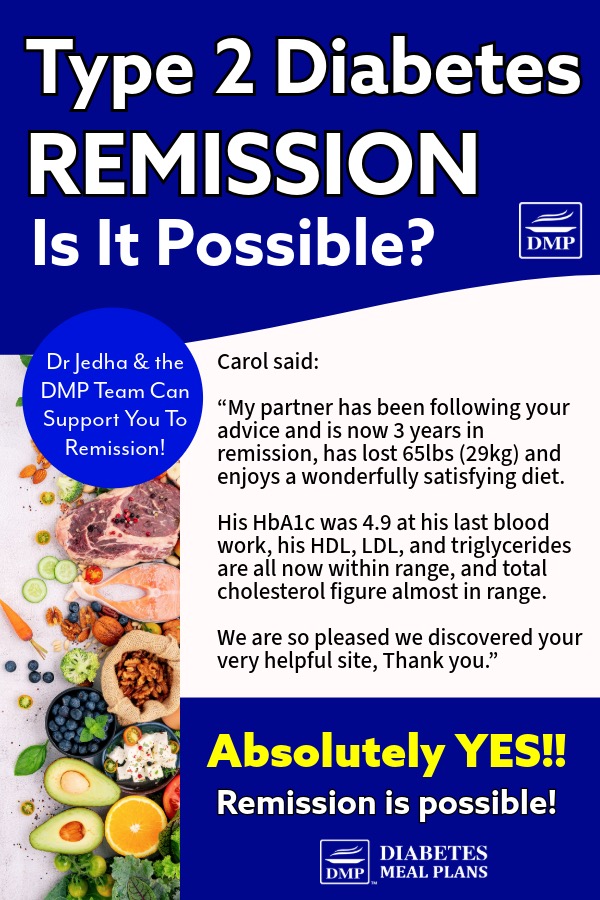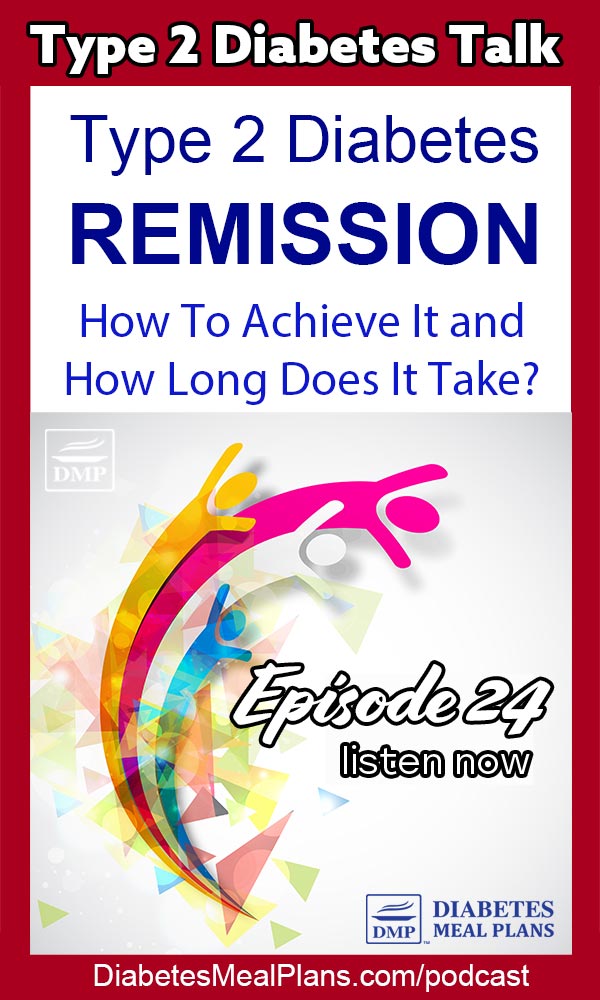Table of Contents[Hide][Show]
You may have heard of type 2 diabetes remission, or perhaps you’ve even wondered, is diabetes remission a real thing and can type 2 diabetes be put in remission?
The short answer is yes, diabetes remission is a real thing and you can put type 2 diabetes into remission.
It was once thought that only bariatric surgery could put diabetes into remission. Over time, research (and experience) have now demonstrated that remission can be achieved through diet and lifestyle changes.
>> Get started today with our scientifically proven T2Diet Program.
LISTEN TO THE PODCAST
CHAPTERS
2:15 Is diabetes remission a real thing?
6:38 The definition of diabetes remission
8:18 How can you achieve diabetes remission?
12:25 Remission testimonial
13:56 How long can diabetes remission take to achieve?
16:20 What are your chances of achieving remission?
19:11 Should you work towards remission?
21:09 Diabetes remission is not a race
Support the podcast by leaving a 5-star rating and review on Apple, Spotify or our Website – Thank You!
Shifting Perspectives on Diabetes Remission
Diabetes remission was first mentioned in the scientific literature back in the 1960s, but back then, it was only thought that remission could be achieved via bariatric surgery.
The first report on the concept of diabetes remission was published in Diabetes Care in 2009, where remission had an overly complex definition for ‘partial,’ ‘complete,’ and ‘prolonged’ remission. But again, the interventions being referred to were largely surgical, for example, bariatric surgery.
In 2017, the Direct Study found that diet alone in the context of an intensive weight loss program led to diabetes remission. Previously deemed a progressively worsening condition, the results of this study sparked a new narrative around type 2 diabetes, illuminating the potential for dietary interventions to induce remission.
In 2019, a position statement published in the British Journal of Diabetes published another definition of remission, based on weight loss, HbA1c under 6.5%, with cessation of all glucose-lowering medications.
In 2020, a scoping review of studies, published in PlosOne Med noted there were 96 different definitions of remission, highlighting there was no international consensus about how diabetes remission was defined; and an urgent need to have some kind of definition to guide more informed decisions for both healthcare providers and people living with type 2 diabetes.
Fast forward to 2021, diabetes organizations across the globe published position statements acknowledging diabetes remission was a real thing, and providing a definition that has become the international consensus for defining remission of diabetes.
Position statements on diabetes remission

Diabetes Remission Defined
Diabetes remission is defined as maintaining an HbA1c level of less than 6.5% without relying on glucose-lowering medications for at least three months.
‘Remission’ was the term chosen over terms like ‘cure’ or ‘reverse’ because it suggests that while diabetes may not be actively progressing, the possibility of relapse exists, similar to the concept of remission in cancer.
How to Achieve Diabetes Remission
There have been 3 methods shown to achieve diabetes remission.
- Bariatric surgery
- Low calorie diets
- Low carbohydrate diets
Bariatric (Weight Loss) Surgery
Studies have shown that surgery can produce remission of diabetes.
However, weight loss surgery also comes with a whole new range of things to deal with:
- Possible complications
- Lifelong supplementation
- Long term nutritional deficiency
Really, surgery should be a last resort.
Interestingly, research experts reached the conclusion that it was the calorie restriction after surgery that likely produced the remission, rather than the surgery itself.
Very Low Calorie Diets
There have been several studies showing very low calorie diets (600-800 calories per day) can put diabetes into remission.
These types of diets need to be conducted under strict medical supervision, as they are very low calorie. Obviously, these diets cannot be sustained long term, so afterwards, personalized dietary modification would need to be adhered to in order to sustain the results.
There has also been debate about the safety of these diets and their potential to cause harm to the body. By restricting calories the body needs for basal metabolic functions, there could be potential for negative effects on body composition and physiology.
Low Carbohydrate Diets
Many studies have shown that a low carb diet can put type 2 diabetes into remission. And that is both keto diets and low carb diets – as these are often put under the same umbrella term ‘low carbohydrate diets.’
Definition of carbohydrate intake
| Carbohydrate definition | Carbohydrateg/day | Carbohydrate% of energya |
| Ketogenic diet | <50 | <10 |
| Low carbohydrate diet | <130 | 10-<26 |
| Moderate carbohydrate diet | 130-225 | 26-45 |
| High carbohydrate diet | >225 | >45 |
But, low carbohydrate diets present a more sustainable and flexible approach, offering a practical alternative to the highly restrictive ketogenic diets.
By allowing for a sustainable intake of carbohydrates, between 50-100 grams per day, which is what we encourage here at DMP, you can facilitate not only weight loss but also significant improvements in glycemic control and overall metabolic health.
A low carb eating plan does not require starvation or deprivation, nor surgical intervention!In fact, a low carb diet is really a very flexible diet that is sustainable over the long term, which is very important for achieving and sustaining remission.

How Long Can Diabetes Remission Take To Achieve?
Diabetes remission isn’t a race, so you need to allow at least 3-4 months to see a substantial change, as this is how long it takes for the HbA1c test to reflect results, because the HbA1c test measures the average glucose in your blood from the previous few months.
For many people, achieving remission can take longer, a year or more; and for others remission might not happen at all.
What Are Your Chances of Achieving Remission?
In evaluating the potential for diabetes remission, it’s crucial to consider the evidence from both clinical trials and real-world experiences.
Studies have shown varying rates of remission, indicating that up to 50% of participants could achieve this state through making changes in their diet and nutrition.
What we know is that remission is certainly a potential, though not a guaranteed outcome.
That doesn’t mean you can’t strive for remission, we certainly recommend you do. We want to see you with an HbA1c under 6.5% on no medications – that should be your goal. Of course, you want to achieve optimal diabetes health!
We’re proud to say our members and subscribers have achieved complete remission, a number of them have sustained their remission long term and are headed toward prolonged remission too.
Carol said: “I can wholeheartedly recommend the low carb diet for remission of diabetes. My partner has been following your advice since early in 2018 and is now 3 years in remission, has lost 65lbs (29kg) and enjoys a wonderfully satisfying diet. His Hba1c was 4.9 at his last blood work, his HDL,LDL, and triglycerides are all now within range, and total cholesterol figure almost in range. This way of eating is completely sustainable and we are so pleased we discovered your very helpful site, thank you.”
>> Get started today with our scientifically proven T2Diet Program.
What Factors Increase Your Chances of Achieving Remission?
The factors that influence likelihood of remission include the duration of diabetes, baseline HbA1c levels, and personal responses to changes in diet and lifestyle.
The earlier in your diabetes diagnosis that you get proactive, the higher your chances of achieving remission – if you’re newly diagnosed diabetes, GET PROACTIVE TODAY!
And for those with prediabetes, you can completely reset your prediabetes and get your HbA1c levels back to normal without medication and not only be in permanent remission of prediabetes, but prevent a type 2 diabetes diagnosis.
Most importantly, research suggests aiming for a weight loss (and maintenance) of 20-35 pounds or 10-15 kg to increase your chances of remission, and also to prevent progression of your disease.
Maintaining a lower HbA1c and decreasing medications is also associated with fewer diabetes-related illnesses, so that’s really important.
The Journey Towards Remission: Every Step Counts
Achieving diabetes remission is a process that requires time, patience, and a realistic outlook. And importantly, the pursuit of remission should not detract from the value of making incremental health improvements.
Progress towards better glycemic control, effective weight management, and reduced medication reliance significantly enhances overall health and quality of life, regardless of whether full remission is achieved.
Every positive step you take should be rewarded!
Get Started On Your Path To Diabetes Remission
Diabetes remission has emerged as a beacon of hope in the management of type 2 diabetes, a light at the end of the tunnel – your diabetes DOES NOT have to get progressively worse, so let us support you in your journey to remission – Join Us As A Member Today!
Subscribe to Type 2 Diabetes Talk on: Apple | Spotify | Amazon Music | Audible | YouTube | Podcast Index | Player FM | and more…



Bev
I’ve been following DMP plans and have now been in remission for six months – couldn’t have done it without you. Thanks for all the work you do!
Dr Jedha - Nutritionist (PhD)
That’s fantastic Bev – keep being proactive to maintain your newfound health!
Carol Slater
I can wholeheartedly recommend the low carb diet for remission of diabetes. My partner has been following your advice since early in 2018 and is now 3 years in remission, has lost 65lbs and enjoys a wonderfully satisfying diet.
His Hba1c was 4.9 at his last blood work, his HDL,LDL, and triglycerides are all now within range, and total cholesterol figure almost in range. This way of eating is completely sustainable and we are so pleased we discovered very helpful your site, thank you. Carol
Jedha: Nutritionist (MNutr)
That’s fantastic Carol! Thanks for sharing :)